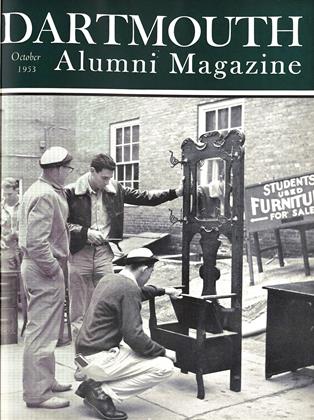This fall will see a major change in the game of football. Mass substitution by platoons will give way to very limited substitutions and a return to "iron man" football. As New England representative on the Football Rules Committee which put the limited substitution rule into effect, Dartmouth Coach Tuss McLaughry was one of those who actively sought the change. Below, for readers of the ALUMNI MAGAZINE, are Tuss's replies to some leading questions on the new ruling.
The Rule: A player withdrawn from the game may not reenter the same period except during final four minutes of the second and fourth periods. Coaches responsible for legality of substitutions. More liberal regulations for preparatory and high school games permissible by mutual agreement.
Question: What, in your opinion, were the major reasons for adopting the new limited substitution rule?
Tuss: The major reasons for the new rule were these: (1) football had degenerated from a team game into a squad game; (2) the large squad of specialists necessary under the two-platoon system was becoming a top-heavy financial burden; and (3) when a player followed the path of least resistance and only exercised his natural aptitude, the game ceased to justify itself from an educational standpoint.
Question: Do you believe that injuries to players will increase under the new rule?
Tuss: No, I think they will decrease if anything. Statistics taken during the past 20 years conclusively indicate that the majority of injuries come shortly after the beginning of participation, probably from insufficient warmup. The old theory that most injuries come when a player is tired is largely a myth. It is the coaches' responsibility to see that no player is allowed to play to the point of exhaustion.
Question: Will you explain how you intend to handle the Dartmouth team under the limited substitution system?
Tuss: It is my pre-season intention to substitute liberally towards the end of each segment of the game in order to rest those who have been in and provide fresh replacements. I plan to have two basic teams, one primarily for offense to use in the early part of the game or when we are behind, the other, a stronger defensive team, to use when we have a scoring lead and want to hold down the opposition.
Question: Do you think the rule will benefit the players and that they will enjoy playing under it?
Tuss: I think the players will all enjoy playing both ways. The benefit will come from character development in that every man will have to develop skills for a two-way job that does not come easily to him.
Question: What about the spectators? How will they like the game under the new ruling?
Tuss: The new rule should increase spectator interest. They'll be better able to identify the players and there will be less confusion. This is the rule that was followed before the war during the "Golden Age" of football when the stadiums were filled to capacity every Saturday.
Question: Do you think the new rule is here to stay or will it be only tried out this year?
Tuss: I have every reason to feel that the new rule will remain in effect for an indefinite time. To change radically after one year's test would tend to make the Rules Committee look ridiculous and indecisive to both players and spectators.
 View Full Issue
View Full Issue
More From This Issue
-
 Article
ArticleMr. President, LL.D.
October 1953 By EDWARD CONNERY LATHEM '51 -
 Class Notes
Class Notes1918
October 1953 By ERNEST H. FARLEY, W. CURTIS CLOVER, RICHARD P. WHITE -
 Article
ArticleThe Faculty
October 1953 By Harold L. Bond '42 -
 Class Notes
Class Notes1926
October 1953 By HERBERT H. HARWOOD, H. DONALD NORSTRAND, CARLETON BLUNT -
 Class Notes
Class Notes1912
October 1953 By HENRY K. URION, FLETCHER CLARK JR., HENRY B. VAN DYNE -
 Class Notes
Class Notes1948
October 1953 By FRANCIS R. DRURY JR., JOHN S. FENNO
Cliff Jordan '45
-
 Article
ArticleSquash
January 1958 By CLIFF JORDAN '45 -
 Article
ArticleLacrosse
May 1958 By CLIFF JORDAN '45 -
 Article
ArticleSoccer
By CLIFF JORDAN '45 -
 Article
ArticleSports Schedule
JANUARY 1959 By CLIFF JORDAN '45 -
 Article
ArticleDartmouth 12, Yale 8
December 1959 By CLIFF JORDAN '45 -
 Books
BooksYOU HAVE TO PAY THE PRICE.
December 1960 By CLIFF JORDAN '45
Sports
-
 Sports
SportsATHLETIC COUNCIL AWARDS SEVENTEEN LETTERS AND TWENTY-ONE NUMERALS
January, 1925 -
 Sports
SportsDartmouth 1928 49—Tilton 19
March 1925 -
 Sports
SportsFreshman Cross Country
August, 1926 -
 Sports
SportsHarvard Victor, 10-7
November 1932 -
 Sports
SportsTennis
May 1953 By Cliff Jordan '45 -
 Sports
SportsWith Big Green Teams
February 1947 By FRANCIS E. MERRILL '26.

